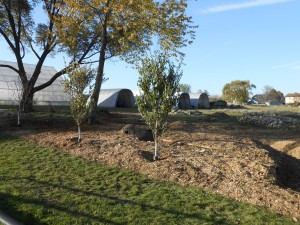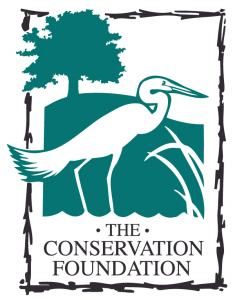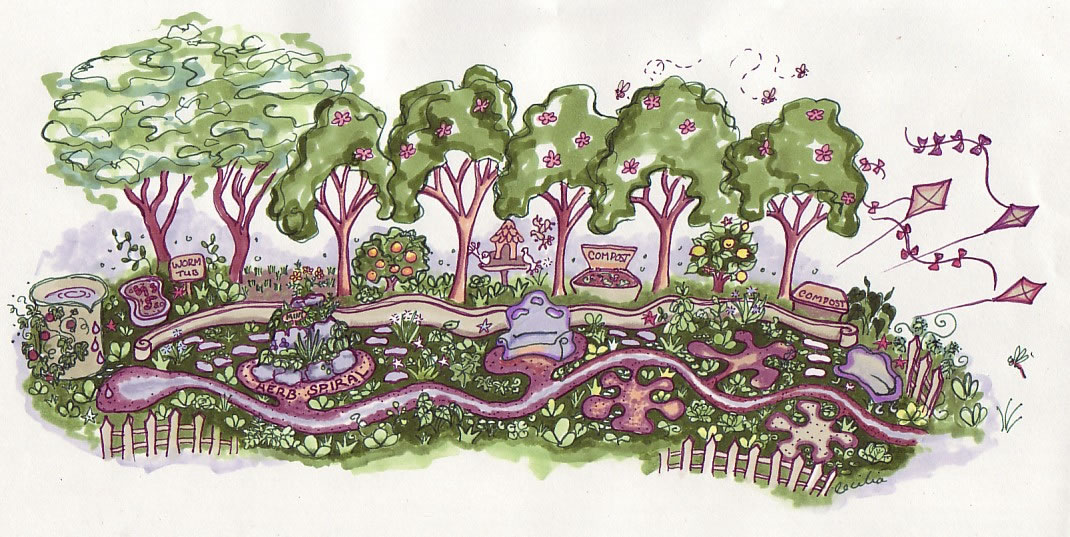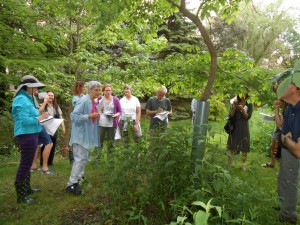An Edible Forest Garden is a land management system that mimics a woodland ecosystem but substitutes in fruit and nut bearing trees and shrubs, perennial vegetables, herbs, flowering and medicinal plants. Companions or beneficial plants are included as insectaries, pest confusers, dynamic accumulators, nitrogen fixers, and mulch plants. Together they create relationships to form a forest garden ecosystem able to produce high yields of food with minimal maintenance. Edible forest gardens can play a significant role in cultivating community food security and reconnecting people with nature.
Benefits of Edible Forest Gardens:
- Provides fresh local food to the community
- Demonstrates a commitment to food security and ecological restoration
- Reduces or eliminates lawn maintenance costs
- Creates a community park
- Serves as an outdoor classroom or educational resource
- Connects people to food and nature
- Inspires the growth of individual edible forest gardens
- Increases wildlife habitat and biodiversity
“As Masanobu Fukuoka once said, ‘The ultimate goal of farming is not the growing of crops, but the cultivation and perfection of human beings.’ How we garden reflects our worldview. The ultimate goal of forest gardening is not only the growing of crops, but the cultivation and perfection of new ways of seeing, of thinking, and of acting in the world. Forest gardening gives us a visceral experience of ecology in action, teaching us how the planet works and changing our self-perceptions. Forest gardening helps us take our rightful place as part of nature doing nature’s work, rather than as separate entities intervening in and dominating the natural world.” ~Dave Jacke, Edible Forest Gardens
Why Grow an Edible Forest Garden?
 Food security is achieved when all people at all times have access to sufficient, safe, nutritious food to maintain a healthy and active life. With 1 in 8 families facing hunger in Northern Illinois, our suburban communities are not food secure. The current food system's dependency on cheap fossil fuels and transportation infrastructure cannot be sustained as resources become constrained, not to mention the impacts their practices have on soil, air, water, and human health. If food delivery trucks stop coming into your community, how long do you think you will be able to feed your family with the food you have access to in your home and from your land? Most communities are said to have only about three days worth of food in their local grocery stores.
Food security is achieved when all people at all times have access to sufficient, safe, nutritious food to maintain a healthy and active life. With 1 in 8 families facing hunger in Northern Illinois, our suburban communities are not food secure. The current food system's dependency on cheap fossil fuels and transportation infrastructure cannot be sustained as resources become constrained, not to mention the impacts their practices have on soil, air, water, and human health. If food delivery trucks stop coming into your community, how long do you think you will be able to feed your family with the food you have access to in your home and from your land? Most communities are said to have only about three days worth of food in their local grocery stores.
It is imperative that we begin growing a new food system that places food security as the primary goal. With more than half of the U.S. population living in the suburbs and an abundance of land, the suburbs can become food producing communities able to feed themselves and support neighboring urban and rural communities.
The Resiliency Institute sees a new suburban reality where underutilized and resource intensive lawns are converted into productive and abundant edible forest gardens growing fresh, nourishing fruits, nuts, vegetables and herbs for public consumption. Fruit and nut trees have supported human  nutrition for thousands of years, but as the population has urbanized, people have lost touch with their food sources—even the ones that grow right in their front yards. The Resiliency Institute's Growing Food Security program aims to change this by bringing tree based food gardens back into communities and reconnecting people with their food sources.
nutrition for thousands of years, but as the population has urbanized, people have lost touch with their food sources—even the ones that grow right in their front yards. The Resiliency Institute's Growing Food Security program aims to change this by bringing tree based food gardens back into communities and reconnecting people with their food sources.
The pleasure of picking a ripe pear, plum, or persimmon from a tree in your yard or neighborhood garden is not just a sweet seasonal joy. It also offers fresh and nutritious food to communities that may lack ready access to quality produce. It educates people about food sources and growing cycles, and about basic tree biology and agriculture. It brings neighbors together to dig and plant and prune and harvest, and to enjoy the delicious bounty of their trees. It engages residents to alter their landscape, turning vacant lots and derelict spaces into beneficial gardens that can help turn a neighborhood around.
EDIBLE FOREST GARDEN CONSULTING
The Resiliency Institute offers edible forest garden consulting to non-profit and private businesses with land and public access. We invite collaborations with hunger relief organizations, park districts, forest preserves, counties, and municipalities interested in addressing food security and regenerative land management. Designing and installing an edible forest garden involves goal creation, community building, and a commitment to creating and maintaining an enduring, productive, ecosystem.
Contact us to schedule an appointment.
We are currently designing and installing two edible forest gardens and one Growing Food Security garden. Each of these projects demonstrates how lawns can be transitioned into food producing systems that regenerate soil, ecology, and biodiversity. People will visit the edible forest gardens and experience the joy of harvesting fresh fruits, nuts, vegetables, herbs, medicinal, and dye plants. They will see bees, birds, butterflies, dragonflies, and other animals. Areas for children and picnics invite people to enjoy the shade and beauty. Combined with educational components and hands-on activities, people will have the tools to grow an edible forest garden in their own yards and begin the transformation of the suburbs into resilient permaculture communities.
The Resiliency Institute Demonstration Edible Forest Garden

In 2013 we began the installation of the FIRST edible forest garden in Naperville on The Conservation  Foundation’s McDonald Farm! McDonald farm is a 60-acre farm surrounded by suburban development, preserved for conservation, education, and agriculture. Over 8,000 people visit the farm annually to participate in activities and learn about renewable energy, water conservation techniques, native landscaping, green roofing, organic farming, and soon, how to transform lawn into an edible forest garden. The Conservation Foundation, a 41-year-old non-profit land and watershed protection organization, owns the farm and is headquartered there.
Foundation’s McDonald Farm! McDonald farm is a 60-acre farm surrounded by suburban development, preserved for conservation, education, and agriculture. Over 8,000 people visit the farm annually to participate in activities and learn about renewable energy, water conservation techniques, native landscaping, green roofing, organic farming, and soon, how to transform lawn into an edible forest garden. The Conservation Foundation, a 41-year-old non-profit land and watershed protection organization, owns the farm and is headquartered there.
The Resiliency Institute demonstration edible forest garden (135’x40’) includes areas for  recreation, children’s exploration, and inspiration. The design incorporates existing trees, re-purposes materials currently there, and reuses the water from the vegetable washing station to irrigate the site through a connected swale/berm system. Being added to the area are 12 trees, 73 shrubs, 14 vines, countless herbaceous and ground cover plants, bridges, rock gardens, rain gardens, mandala garden, kiwi igloos, and hop arbors. It is a demonstration and educational programming tool for how we can transform suburban lawns, grow food security, and have beautiful, self-maintaining landscapes.
recreation, children’s exploration, and inspiration. The design incorporates existing trees, re-purposes materials currently there, and reuses the water from the vegetable washing station to irrigate the site through a connected swale/berm system. Being added to the area are 12 trees, 73 shrubs, 14 vines, countless herbaceous and ground cover plants, bridges, rock gardens, rain gardens, mandala garden, kiwi igloos, and hop arbors. It is a demonstration and educational programming tool for how we can transform suburban lawns, grow food security, and have beautiful, self-maintaining landscapes.
Ferry Forest Garden

Naperville, IL
Soon Illinois Prairie Path users will be able to enjoy foraging and relaxing at the Ferry Forest Garden, a third-acre of DuPage County right-of-way land along the Illinois Prairie Path on Ferry Road just west of 59 in north Naperville. With the help of volunteers, The Resiliency Institute began the land's transformation with sheet mulching in November, 2014.
In spring 2015, we planted 20 trees funded by the Illinois Prairie Path. Over 30 shrubs and a hugelkultur berm have also been installed funded by The Resiliency Institute until sponsorships can be secured. We would love to include a gazebo made from pruned branches with a mosaic tiled floor growing with grapes and artwork crafted from scrap materials inviting path users to enter the garden and explore. This project is expected to cost $16,000 including all plantings and signage. All labor has been volunteered.
Northern Illinois Food Bank Growing Food Security Garden

Growing Food Security Garden 2014
The Resiliency Institute is developing a Growing Food Security pilot program to introduce Northern Illinois Food Bank and its network partners to permaculture as another approach to growing food security. Through the installation of “Growing Food Security Gardens” at the food bank and its network partner locations we will be providing an educational tool and a scalable model for building community edible forest gardens. Nutritious, organic fruits, vegetables, nuts, seeds, and herbs will become freely available for food insecure people to harvest within the communities served by the Northern Illinois Food Bank and its network partners.
Northern Illinois Food Bank serves 13 counties surrounding Chicago and has 800 network partners (pantries, soup kitchens, shelters, child and senior sites) assisting 600,000 people annually. The demands placed on hunger relief organizations have increased dramatically in the last few years with 46.5 million people living in poverty, the largest number since statistics were first published more than 50 years ago. This program is designed to offer another option for feeding people that increases self-reliance and decreases use of hunger relief organizations.



